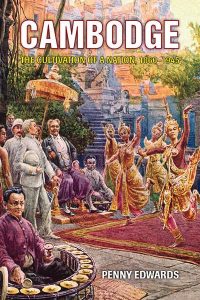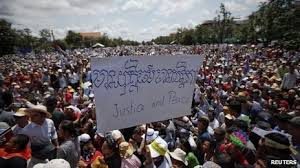Hobbes’ state of “continual fear, and danger of violent death,” prevails for those thinkers and artists in Cambodia who dare to dream a different future.
The Khmer Rouge regime was (per Hobbes), “nasty, brutish and short.” Founded in April 1975, it was toppled on 7 January 1979 not through international action but by a renegade movement, backed by Vietnam and spearheaded by three ex-Khmer Rouge cadre. The most junior in age and rank was Hun Sen, who is now in his thirty-first year in office and Asia’s longest serving prime minister.
The actress who expressed her debt to Hun Sen was speaking from the heart. From such sentiments,

About the author
Penny Edwards is Associate Professor of Southeast Asian Studies at the University of California, Berkeley.
Hun Sen and the Cambodian People’s Party have carved their redemption narrative. The message is clear: we have saved you from terror, and if we fall, Cambodia will return to darkness. A major plank of propaganda in the 1980s, this mantra of self-sacrifice has been a mainstay of the Party’s campaign trail since the UN-sponsored election of 1993. A keynote of this anthem is that the Khmer Rouge killed off Cambodia’s artists and intellectuals, reducing a once glorious culture to rubble.
The message is clear: we have saved you from terror, and if we fall, Cambodia will return to darkness.
One such artist was singer and songwriter Sinn Sisamouth (1932-1976), whose genius is celebrated in the 2015documentary Don’t think I’ve forgotten: Cambodia’s lost Rock and Roll. If digital retouch has restored fresh intimacy to Sinn Sisamouth’s voice, the passage of time has worked a different magic, rebirthing the title love-song as a posthumous threnody to its creator and, by extension, to all artists killed by the Khmer Rouge.
“Don’t think I’ve forgotten” Sinn Sisamouth croons, “I remember everything, so many stories.” The Khmer word for “stories”(roeung) has a wide range. It can also refer to “events”, including those of a political nature. To “seek” (rook) roeung means to look for trouble or stir things up.














